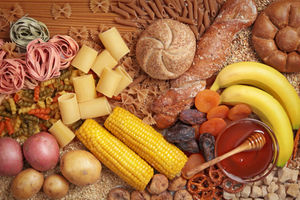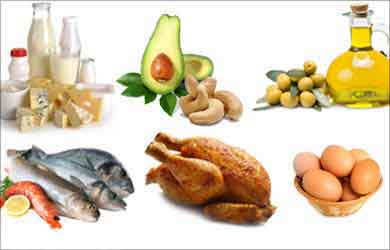What Are The Six Essential Nutrients For All Animals?
In full general, the nutrients that are necessary for proper body functions include 6 groups: proteins, carbohydrates, fats, minerals, vitamins and water. The daily requirements for each group vary, depending on historic period, sex, and physical action. By including fruits, vegetables, lean proteins, whole grains, dairy products and salubrious fats in your nutrition, y'all can get a good amount of these nutrients naturally. If you are non sure whether you are having a balanced diet, consult a dietitian.
Nutrients and Their Sources
one. Proteins

Protein is a necessary nutrient to ensure the normal growth of peel, bone and muscle. It can be mostly plant in animal sources such as poultry, meat and fish. Consuming enough protein is not a trouble in industrialized countries such every bit the U.S. If you are a vegetarian, then you need to eat a practiced amount of beans, nuts, and whole grains to make sure you get the proper amount of poly peptide that your body needs.
two. Carbohydrates

When it comes to nutrients and their sources, yous should not forget carbohydrates. Carbohydrates are fuel for the body. The sources of carbohydrates include vegetables, fruits, grains, legumes, flour, sugar and dairy products. They provide the energy for physical activity and other involuntary body functions such as the heartbeat, digestive procedure and breathing. They should account for almost 40% to 60% of the daily full calorie intake.
3. Fats

While trans-fats and saturated fats must be avoided, monounsaturated fats and polyunsaturated fats should exist included in your diet. Salubrious fats tin be plant in sources like avocado, all kinds of basics (cashews, macadamia nuts, almonds, peanuts, hazelnuts, pecans, etc.), natural peanut or almond butter (made with but the oil coming from the nuts, without whatever additional fatty added), sunflower, sesame seeds, pumpkin seeds, olives, tofu, soy milk, and fish that are rich in fat like salmon, trout, herring, tuna, sardines or mackerel.
4. Vitamins and Minerals
Now yous know some nutrients and their sources. Here is a chart telling you lot the sources of some of import vitamins and minerals.
| Phosphorus | Squash, pumpkin seeds, cheese, salmon, tuna, bother, mackerel, scallops, venereal, clams, basics, lentils, tofu. |
| Potassium | Bananas, mushrooms, avocado, spinach, potatoes, dried apricots, yogurt, salmon. |
| Selenium | Chia seeds, sunflower seeds, sesame seeds, brownish rice, broccoli, cabbage, spinach, shiitake mushrooms. |
| Sodium | Table common salt, salad dressings, sauces, pickles, cured meat, cheese, canned vegetables, instant soups, fast foods. |
| Biotin | Carrots, nuts (especially almonds and walnuts), eggs, raspberries, strawberries, Swiss chard, milk, onions, cucumbers, cauliflower, halibut. |
| Calcium | Spinach, almonds, milk, cheese, yogurt, oranges, black beans, figs, squid. |
| Chlorine | Cabbage, cauliflower, broccoli, lettuce, Brussels sprouts, tomatoes, potatoes, eggplant, celery, olives, peppers, seaweed. |
| Choline | Shrimp, eggs, peanuts, liver, scallops, chicken, tuna, salmon, turkey, pasta, rice, spinach. |
| Copper | Swiss chard, spinach, kale, asparagus, oysters, shiitake mushrooms, sesame seeds, nuts. |
| Folic acid | Avocado, lentils, broccoli, spinach, Brussels sprouts, asparagus, papaya, oranges, strawberries, raspberries, grapefruit. |
| Iodine | Egg, brewer's yeast, molasses, cheese. |
| Atomic number 26 | Clams, squash, liver, pumpkin seeds, sunflower seeds, nuts, beef, lamb, beans, whole grains, spinach, tofu, dark chocolate. |
| Magnesium | Nuts, pumpkin seeds, spinach, fish, beans, avocados, yogurt, bananas, stale fruit, dark chocolate. |
| Manganese | Clams, mussels, nuts, pumpkin seeds, sunflower seeds, spinach, beans, tofu, black tea. |
| Niacin (B3) | Turkey, tuna, craven breast, mushrooms, liver, peanuts, light-green peas, avocado. |
| Pantothenic acid (B5) | Shiitake mushrooms, sweet spud, sunflower seeds, salmon, avocados, broccoli, corn, lentils, craven. |
| Zinc | Chicken, pumpkin seed, lamb, cashews, yogurt, cocoa pulverization. |
| Pyridoxine (B6) | Cabbage, spinach, tuna, bok choy, garlic, cauliflower, bell peppers. |
| Riboflavin (B2) | Cheese, mushrooms, spinach, oily fish, pork, almonds. |
| Thiamin (B1) | Trout, tuna, mackerel, pork, sesame seeds, chia seeds, pumpkin seeds, nuts, light-green peas, asparagus. |
| Vitamin A | Sweet potatoes, spinach, dried apricots, carrots, lettuce, liver, cantaloupe, fish, bell peppers. |
| Vitamin B12 | Low fatty dairy, eggs, cheese, shellfish, crab, tofu, soy milk, red meat, liver, fish. |
| Vitamin D3 | Oily fish, fish roe, mushrooms, pork, tofu, eggs. |
| Vitamin E | Spinach, almonds, wheat germ, sweet potato, avocado, sunflower seeds, olive oil, trout. |
| Vitamin Yard | Broccoli, cabbage, Brussels sprouts, prunes, kale, asparagus, cucumber. |
5. Water

It is important to know essential nutrients and their sources. Water is one of these essential nutrients and you need to ensure a good amount of daily water intake. This can be accomplished by but drinking plain water or eating vegetables and fruits that have loftier water content. A few examples include cucumber, zucchini, celery, lettuce, cauliflower, spinach, eggplant, radish, pepper, red cabbage, watermelon, raspberries, strawberries, cranberries, grapefruit, pineapple, cantaloupe and oranges.
Source: https://www.newhealthadvisor.org/nutrients-and-their-sources.html
Posted by: smithbanke1953.blogspot.com

0 Response to "What Are The Six Essential Nutrients For All Animals?"
Post a Comment